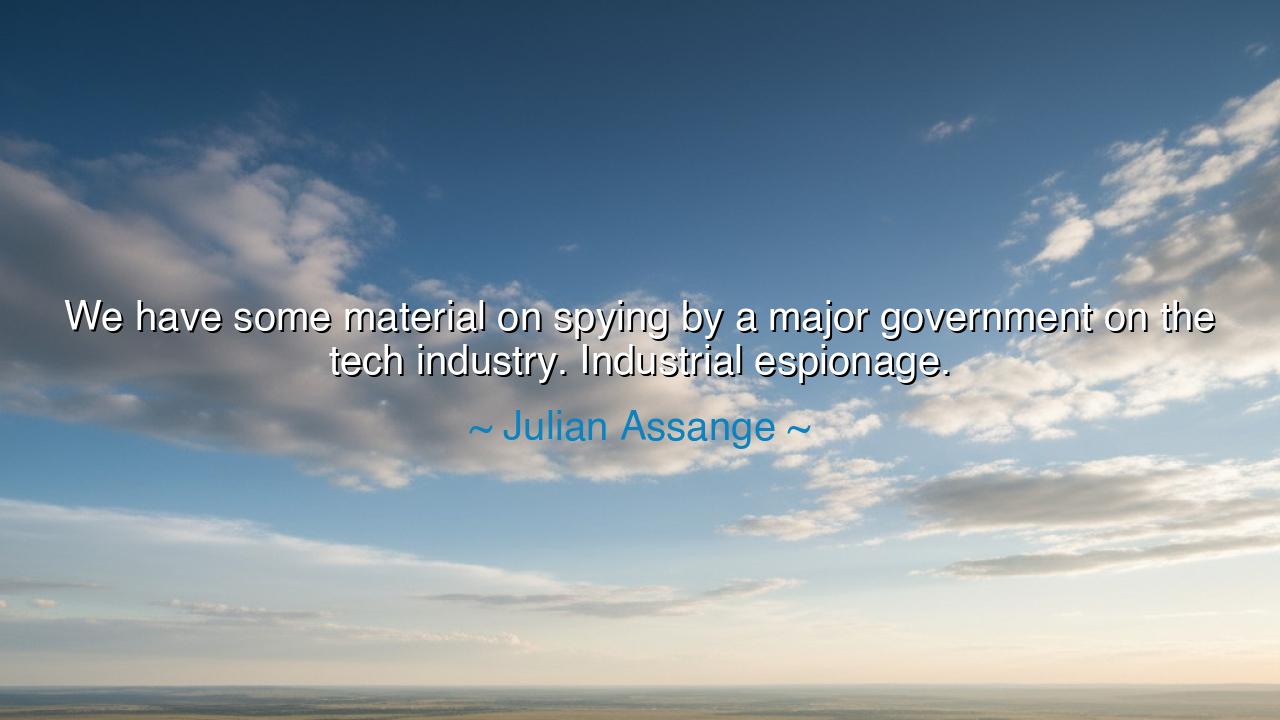
We have some material on spying by a major government on the tech
We have some material on spying by a major government on the tech industry. Industrial espionage.






Hear, O guardians of truth and seekers of light in the digital age, the words of Julian Assange, who declared: “We have some material on spying by a major government on the tech industry. Industrial espionage.” In this brief but thunderous utterance lies the clash between knowledge and power, between those who create and those who control. Assange, founder of WikiLeaks, spoke as one standing upon the edge of revelation, unveiling what the powerful had concealed. His words echo through the corridors of history as both a warning and a cry: that the modern world, though gilded with technology, still hides ancient deceit beneath its polished code.
The origin of this quote lies in Assange’s work with WikiLeaks, the platform that exposed classified documents and secret communications from governments around the world. Around 2010–2011, WikiLeaks began to reveal vast caches of information concerning surveillance, cyber intrusion, and the covert operations of global powers. This particular statement referred to the discovery of industrial espionage—the theft of technological and corporate secrets by a major government, likely hinting at the massive surveillance operations that entwined intelligence agencies with corporate interests. Through these words, Assange exposed not merely the existence of spying, but the moral erosion that occurs when governments manipulate innovation to serve dominance instead of progress.
Assange’s declaration is not just about espionage; it is about the corruption of trust in a world bound by digital networks. Once, power was measured by armies and borders. Now, it is measured by information—and those who control it can shape reality itself. The act of a government spying upon the tech industry is not a mere theft of secrets; it is the desecration of creativity, the invasion of human ingenuity. It suggests a world where innovation is no longer the fruit of freedom, but the target of exploitation.
History, too, bears witness to this recurring sin. In the Cold War era, both the United States and the Soviet Union engaged in relentless industrial and technological espionage, stealing blueprints, software, and research to gain supremacy. When the Soviets stole atomic secrets from the Manhattan Project, they accelerated their own nuclear program—but in doing so, they deepened global mistrust and fear. Likewise, when modern governments infiltrate corporations and competitors, they erode the fragile foundation of mutual trust upon which free enterprise depends. In every age, the lust for control corrupts the very tools meant to uplift humanity.
Yet Assange’s voice rises not only in accusation, but in revelation. He reminds us that the digital age, for all its brilliance, has made us vulnerable. Every invention—every chip, every network, every server—can become a doorway for unseen watchers. The same networks that connect humanity can also enslave it if left in the hands of those without conscience. Thus, Assange’s words are both mirror and flame: a mirror to show us our peril, and a flame to awaken moral vigilance.
There is a paradox here that humbles even the wisest: technology was meant to liberate, yet it can also ensnare. The same circuits that carry messages of hope can carry the whispers of manipulation. When governments use surveillance not to protect their people, but to compete, control, and coerce, they betray the very principle of governance—that power must serve the people, not prey upon them. Assange’s warning, then, is not only political; it is ethical, calling upon citizens and creators alike to guard the integrity of the digital world.
The lesson is both urgent and eternal: truth must never bow to secrecy when secrecy shields corruption. Every individual who values freedom must demand transparency and accountability from those who wield technological might. Let inventors guard their innovations, let citizens question authority, and let nations remember that knowledge without morality becomes tyranny.
So let Assange’s words ring like a bell in the age of machines: beware the government that spies on progress, for it fears the freedom of those who think. In this new era, courage must dwell not only in warriors and statesmen, but in the programmers, the journalists, and the common people who refuse to let truth be buried beneath the weight of power. For when knowledge is guarded by the few, liberty dies; but when it is shared by the many, humanity ascends once more into the light.






AAdministratorAdministrator
Welcome, honored guests. Please leave a comment, we will respond soon